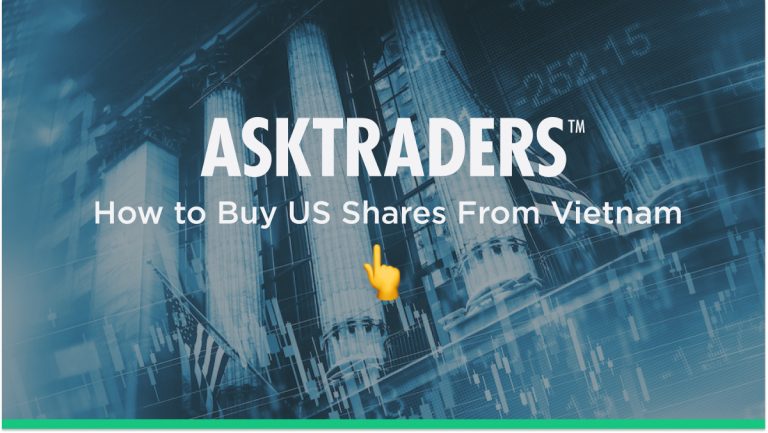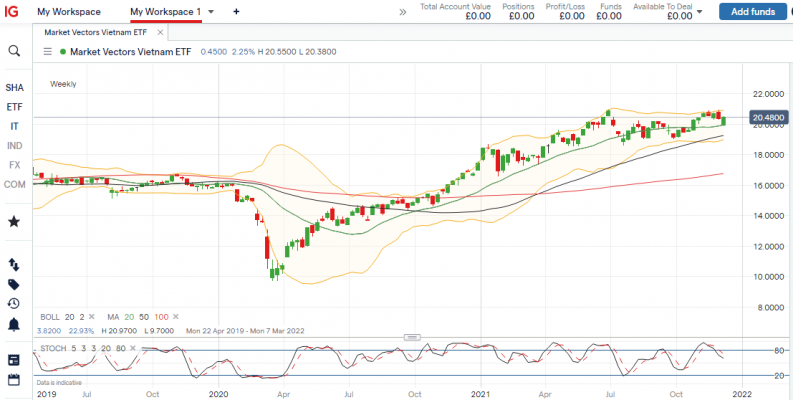
How can we measure this success compared to the rest of the world? Vietnam is only one of a handful of national economies that grew and continues to grow during the global COVID-19 lockdown. A quick review of the pricing behaviour over the past 30 months of an Exchange-Traded Fund (ETF) that covers the leaders in the two Vietnamese stock exchanges reveals that values accelerated over this period after a minor dip in early 2020. Not only did share values accelerate, they surpassed pre-COVID levels and presently are ranging in anticipation of more growth. An increasingly popular strategy is to buy US stocks from Vietnam.

Source: IG
Once an impoverished nation, the World Bank has noted that “Economic reforms since the launch of Đổi Mới in 1986, coupled with beneficial global trends, have helped propel Vietnam from being one of the world’s poorest nations to a middle-income economy in one generation. Between 2002 and 2020, GDP per capita increased 2.7 times, reaching almost US$2,800. Over the same period, poverty rates (US$1.90/day) declined sharply from over 32 percent in 2011 to below 2 percent”. (Source: The World Bank)
While Vietnam made great strides in reducing domestic poverty, its economic ranking on a global basis also soared. It is currently the 37th-largest economy in the world according to nominal gross domestic product (GDP). Furthermore, according to purchasing power parity (PPP), the country was the world’s 23rd-largest economy in 2020.
Has an investor class arisen within Vietnam? Are local citizens benefiting from this success and investing on the global stage? Up until that slight dip in 2020, and from 2015 onwards, the local economy in Vietnam had experienced unprecedented annual growth of 6.7% for five years in a row. Per one observer, “Vietnamese people are living in a great shift seeing their country develop so rapidly before their eyes, and new wealth is being created daily. People are getting better off and moving into the middle class. This is great to see”. (Source: Investments for Expats)
As for wealth accumulation in a ‘mixed socialist-oriented market economy’, BMI reports that the middle class in Vietnam is estimated to be 44 million people and that these individuals currently earn around $714 per month. More importantly, the report notes that the number of millionaires in the country has tripled and “Vietnam boasts the world’s fastest growing percentage of ultra-high-net-worth individuals” (Source: BMI).
The benefits of globalisation and a freewheeling economy have created disposable funds in need of investment in Vietnam. Where do these local investors invest their idle capital? There are two stock exchanges in Vietnam, although there are plans to combine them. The Ho Chi Minh exchange (HOSE) is the largest, with 377 listed companies and with $180m in daily turnover. The major companies in Vietnam are listed on the HOSE. The Hanoi exchange (HSX) has 367 listings and daily turnover of $39 million. The HSX is home to small-to-medium companies.
Due to restrictive currency controls and government red tape to overcome, Vietnamese citizens typically invest in these two local exchanges using a local broker. While investing overseas may be an easier task for the ultra-wealthy, funding an investment account with a foreign broker may be problematic for the average citizen of Vietnam. The benefits of investing overseas, however, are several in numbers, and investors from Vietnam favour, above all, the stock markets in the US for this purpose.
Can citizens of Vietnam legally invest in the US Stock Market?
There are no legal restrictions in the United States that would prevent a citizen of Vietnam from investing in any of the US stock exchanges. Reconciliation between the two countries took place decades ago. US income taxes also do not apply to non-resident aliens, who invest in the US, but there may be taxes withheld at the source pertaining to dividends when paid. As for tax implications in Vietnam, check with your personal tax advisors. The issue is how to acquire foreign shares while domiciled in Vietnam. Finding an online broker may be easy, but moving funds offshore for investment purposes may require special authorisations.
How to buy US shares from Vietnam
Citizens of Vietnam may invest overseas, but the process may be problematic, although not impossible. The term used in local law is Direct Outward Investment (DOI). Citizens are authorised to conduct DOI activities, but even if the intended investment is less than $870,000, an authorisation certificate is a requirement.
The law specifically states that “An investor seeking to conduct DOI needs to obtain an outward investment registration certificate (“OIRC”) from the Ministry of Planning and Investment (“MPI”), and, depending on the scale of the project, may need to seek prior approval from the Prime Minister or the National Assembly of Vietnam if the amount of the proposed project exceeds VND20 billion or falls under certain legally defined categories.” (Source: Indochine Counsel)
Using a local broker may allow a citizen to be covered by the broker’s umbrella authorisation, but if you prefer to use one of the may excellent international online brokers, like IG Group or eToro, it would be advised to obtain the necessary authorisation first and then discuss funding options with your local banker.
Is there a minimum budget required?
If you are planning to invest for the long-term, then you may wish to invest regular amounts per month, but overseas’ transfer costs can be significant and eat away at your funds to invest. Most brokers today have very low initial deposit requirements, anywhere from $100 to zero, and many charge no deposit fees, as well. The issue will be with your transfer method. Banks can charge a substantial fee to move money about the globe, whether you use a money wire transfer, credit or debit card, or any one of the many regional and local transfer payment services.
The larger question will be how much you wish to invest in a single security. Broker minimums may also apply based on the company share or ETF share chosen. Investing overseas is a good way to diversify your investments, but advisors suggest that anywhere from 20% and higher may be the correct allocation, but this amount will depend on your personal risk tolerance and future goals.
Why you should invest in the US stock market
The largest recipient of foreign direct investment is the United States. Investors choose to invest in the US market for a multitude of reasons, which can be for stability, the strength of the US dollar, an unparalleled climate for innovation, transparent and fair business environment, and last of all, for its thriving capital markets. In addition to these characteristics, foreign investors look to the US primarily for a safe haven for diversification of the risk in their portfolios. The breath of opportunities is extraordinary, and potential profitable ventures are numerous.
What investments are the wisest to consider?
Advisors tend to be straightforward when counselling foreign investors about the US market: “The best way to grow your money investing in US stocks is to choose the best high-quality US stocks that generate consistent income and lock in your profit regularly. Mix your portfolio with the best blue-chip stocks, high-dividend growth stocks, and an ETF that tracks the NASDAQ”. (Source: DailyPik)
The NYSE holds the ranking as the world’s largest exchange. It offers a broad base of blue-chip securities, many of which are household names like these examples:
- Alibaba (BABA): China’s answer to Amazon;
- Citigroup (C): Global banking and financial services institution;
- Exxon Mobil (XOM): One of the world’s largest energy providers;
- General Electric (GE): Major industrial complex focused on aviation, power, and healthcare;
- Visa (V): World’s leading payment processing corporation;
- Wal-Mart (WMT): Number One retail marketing corporation across multiple markets;
- Walt Disney Company (DIS): Entertainment, media, and theme park conglomerate.
Technology companies proliferate the Nasdaq exchange. The following tech giants are just a few of the familiar household names to be found here: Apple (APPL), Amazon (AMZN), Facebook (FB), Google (GOOGL), Microsoft (MSFT), Netflix (NFLX), Intel (INTC), Tesla (TSLA), and on and on.
Conclusion
Vietnam seems to be a modern-day success story with no end, and its citizenry is benefiting, as its standard of living is on the rise and new pockets of wealth are being created. Investing these disposable funds in the future is now a reality for many, and investors in Vietnam, like their brethren in other markets, long to invest in US shares.
It is a prudent strategy but check with local advisors to acquire the proper authorisations. Choose a safe broker as your business partner and prepare a plan of attack on how much you wish to allocate to US shares. Lastly, ensure to monitor your investments.




